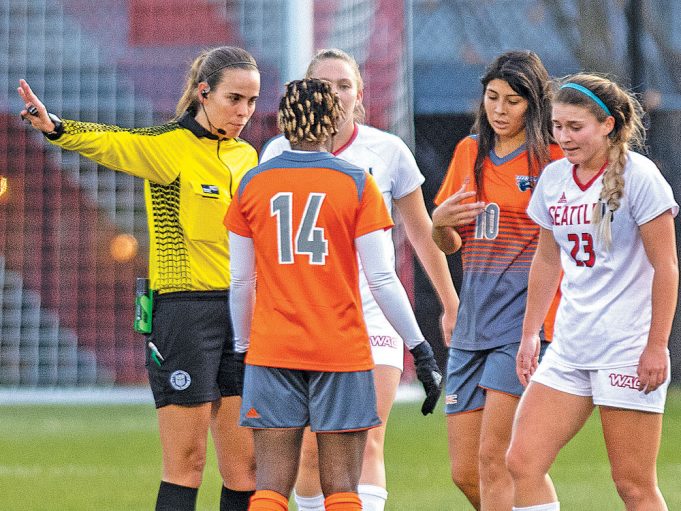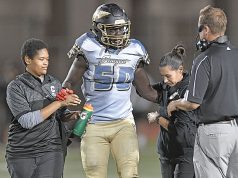I’ve never known an official who was completely satisfied with game assignments. Most think highly of their capabilities and believe they deserve the big games. If they don’t come their way, it’s easy to chalk it up to the assigner rewarding buddies or suck-ups. In fact, many legitimate factors the average official probably doesn’t think or know about enter into the process of deciding who merits a given assignment.
There are assigners who act from impure motives. I knew one who had a loose hold on a college umpiring slot and feared competition. Two younger guys in his area were threats and he gave them lousy assignments to keep them from getting exposure. Eventually I had the chance to hire them, and both ended up in the College World Series.
I’ve known others who favored friends or penalized people they didn’t like. My local high school football assigner gave himself a full slate of playoff games, even at positions he didn’t usually work.
Are there factors that affect the assigning process that ideally wouldn’t? Yes. Sometimes a boss told me not to put official X in a game. Maybe X had done nothing wrong but had ruffled the feathers of someone who could call the shots. Inclusion may also affect the process.
We always hear all games are important, but the reality is some have a far greater impact than others.
You may think of a matchup featuring undefeated teams. I may have in mind cellar-dwellers in a heated rivalry or a game in which the coaches are notoriously difficult. There are also gradations among games. For different reasons, game X may be more challenging than Y but less so than Z. There are degrees and different kinds of “big.” Each year I ranked games by difficulty, considering history, talent, location, rivalries, etc. I ended up with several in categories which I labeled, for lack of better terminology, huge, pretty big and so-so (on paper, at least; one never knows how they’ll turn out).
I scaled my officials based on judgment; rules and mechanics; game management and communication skills; and appearance, and grouped them as top-tier, average and young but with potential. Where officials are in the pecking order will affect their assignments. The reality is that I may not share an officials’ estimation of their capabilities, so I may not give them any huge or pretty big games. If one is top-tier, how many plums they get will depend in part on how many others are in that group. For morale purposes I spread the cream around and ensured each official in each group got roughly the same number of games.
I also thought among top officials, some are more adept in certain areas. I made judgments about who is best suited for the demands of each game. If it will involve two challenging coaches but I felt diplomacy isn’t X’s strong suit, I’d give another official that game. To keep seasoned officials from getting complacent and show that no one is too good to work any game, I also gave my best officials some lower-level games.
I helped newer officials by means of a slow maturation process. Each year I gave them games more challenging than last year’s. If they handled them well, they’d get tougher ones next year. So, if Joe or Jill isn’t top-tier but is an up-and-comer, he or she may get a plum as a test. Insofar as I did that with others, it decreased the number of big games for the top officials.
As for particular issues involving officials, do they have a problematic history with a team? If one had been in a game with controversy — especially if the official was at fault — and I felt it would be healthy for everyone to have a “timeout,” I might keep the official away from one or both teams until the dust has settled.
What is the chemistry between X and other officials in the game likely to be? Some can’t get along with, or try to dominate, others. A few won’t put their issues aside to work a game. If I had assigned Pat to a game and felt that putting Terry in it was a recipe for disaster, I assigned Pat elsewhere.
If an assigner puts Pat in a game, how many times will he or she see the teams during the season? Even if top-level teams are involved, familiarity breeds contempt. You don’t want Pat to see a team more than two or three times unless it can’t be helped or to work a game this week if he or she had one of the teams last week. If there’s a challenging game down the road an assigner wants Pat to work, he or she may not be assigned to that one because of the time element.
In sum, assigning is a complex process involving parceling out a limited number of games of varying degrees of competitiveness and difficulty to officials of wide-ranging experience, caliber and strengths, based on myriad factors. If an official isn’t getting what he or she perceives as big games or as many as desired, it’s likely because official and assigner don’t define the term the same way, the assigner likes to spread the wealth around, or the assigner doesn’t have the official pegged at a high-enough rung on the ladder. In the latter case, the official will need to change the assigner’s perception to change the outcome.
What's Your Call? Leave a Comment:
Note: This article is archival in nature. Rules, interpretations, mechanics, philosophies and other information may or may not be correct for the current year.
This article is the copyright of ©Referee Enterprises, Inc., and may not be republished in whole or in part online, in print or in any capacity without expressed written permission from Referee. The article is made available for educational use by individuals.
















